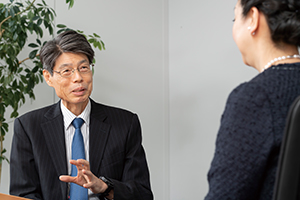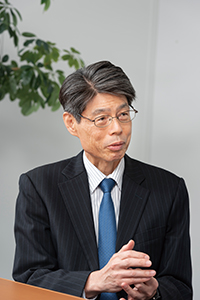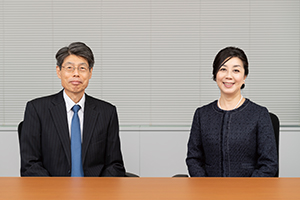 |
|||
|
|
|||
|
View from the Top Vol. 18, No. 2, pp. 1–4, Feb. 2020. https://doi.org/10.53829/ntr202002tp1
Taking on Challenges with Three Strategies: Expansion, Evolution, and Maximization for the Global Top 5OverviewNTT DATA ranked ninth in °»Brand Finance IT Services 15 2019°… published by Brand Finance in 2019, showing its brand value to the world [1]. The company is striving to expand its business globally across 53 countries. We asked Tsuyoshi Kitani, NTT DATA executive vice president and director, about the medium-term management plan announced in May 2019 and his attitude toward work. Keywords: strategy, global, center of excellence Understanding people and cultures and foresight into social needs are key—Can you tell us about NTT DATA’s medium-term management plan? Regarding our medium-term management plan announced in May 2019, in addition to further accelerating digital transformation to maximize value provided to our clients, we want to increase global synergy within the NTT Group based on the following three strategies: (i) expanding global digital offerings, (ii) delivering greater value to clients based on regional needs, and (iii) unleashing our employee’s potential that maximizes organizational strengths. Through these strategies, we aim to achieve net sales of 2.5 trillion yen and an operating income margin of 8% in fiscal year 2021, ending March 31, 2022. This is a pretty challenging goal. At the same time, we are aiming to break into the global top 5 in terms of sales in the information technology (IT)-service industry. Although we are currently in eighth place and our competitors are quite strong, we want to expand our business in North America and Europe to further increase our overseas sales ratio to reach the top 5. This target is also a challenge; even so, we want to spread our brand as an innovative company trusted by clients worldwide. Regarding the first strategy, expanding global digital offerings, I think it would be easier to understand if you consider our offerings as solutions. These solutions can be used both in Japan and globally. Focusing on finance, insurance, cars, distribution, healthcare, and life science industries, we intend to create these solutions in collaboration with domestic and international team members and provide them to clients. For the second strategy, delivering greater value to clients based on regional needs, companies we acquired have been providing IT services in each region, and even from a global perspective, there is no such thing as a uniform business. Our clients’ businesses also vary, so it is necessary to adapt to the characteristics of each region. For example, the current scale of business in the US—which focuses on outsourcing—is about 400 billion yen. Outsourcing in this case refers to IT outsourcing, namely, provision of total services from the development of business applications and maintenance and management of software to take charge of infrastructure-related operations such as server computers and networks, and business-process outsourcing. To achieve further growth, we have begun to develop automation tools and organize processes and will continue to develop and execute business strategies according to regional characteristics. Finally, the third strategy, unleashing our employee’s potential that maximizes organizational strengths, means maximizing organizational strengths by enhancing the capability of employees globally according to our common values—namely, clients first, foresight, and teamwork. We are currently training employees to improve their digital and technical skills. By fully taking advantage of these skills, we can not only propose new services to clients but also improve our productivity. I believe these benefits will lead to the reforming of work styles. We will also establish an appropriate governance system to prevent unprofitable projects from continuing and strengthen information security governance. Regarding information security, we and our clients may be subject to various attacks; accordingly, we have launched a project called “ZEN” to protect corporate organizations and data and are promoting it globally by skillfully applying new security measures and IT mechanisms. —What is the key behind these strategies? I think it is understanding people and cultures and having the foresight into the needs of society. The NTT DATA Group currently has about 130,000 employees, and those overseas account for about 90,000 of this total. The number of employees outside Japan is the largest, and sales outside Japan account for about 41% of totals sales, so this naturally infers that clients outside Japan are increasing in number. Under these circumstances, we must consider strategies not only from the Japanese perspective but also from those of other countries. Each region and country has a different cultural background, and businesses are established on the basis of such background. A strategy can only become global through understanding each other’s cultural backgrounds, and the NTT DATA Group can work together as a united global company to grow our business. I believe that by promoting cutting-edge technologies and innovations and using them effectively, we will be able to meet the expectations of society and reach the targets in our management plan. This is the foresight I mentioned previously. Being in charge of technologies, I’m in a position to plan and execute technology and innovation strategies for the entire group while promoting technologies—and their applications and development—that should draw the attention of the group. It is necessary to introduce new technologies to clients in a way that is easy to understand and clearly explain how they can be useful; to that end, it is important to understand client needs, create the technologies required to meet those needs, and provide them to clients in a stable manner. To promote this strategy globally, appropriate technical skills are required. In particular, I make sure new employees thoroughly study technologies then gain experience through on-the-job training. The artificial intelligence (AI)-related business is growing rapidly; thus, we are focusing on it. Among the fields in which AI is used, healthcare is a particular focus of ours. An easy-to-understand use case is AI analysis of medical images. For example, X-ray, magnetic resonance imaging, and computed-tomography-scanned images are analyzed by specialists such as radiologists to diagnose diseases, and AI is used to assist such analysis. Since the accuracy of AI is quite high, it is also useful for addressing the shortage of doctors as well as reducing the rates of misdiagnosis. We have increased our efforts concerning deep learning and are collaborating with partners abroad. To that end, we have launched a center of excellence (CoE) that is tasked with nurturing technical skills and spreading the associated knowledge through leadership positions. As an organization for consolidating technical knowledge for NTT DATA as a whole, the CoE is collecting good practices and methods, supporting client projects, and providing training for employees. The CoE represents a pretty significant move for us. We also are developing software at home and abroad, and it is very important to improve the productivity of that development. With that importance in mind, we are currently working on automating software development. Major initiatives are automatically generating and running source code of programs from design information and providing a development environment containing a wealth of development tools on the cloud.
Spare time for communication—What do you value when carrying out these tasks? I value communicating, which is the key behind our strategies as I mentioned earlier. Ways of thinking and cultures worldwide and even within Japan naturally differ; thus, it is very important to understand those differences. To attain such understanding, it is best to meet in person and speak as much as possible. However, such meetings are often difficult, so I frequently exchange emails and make phone calls in an effort to understand others. My schedule is usually full from morning until night, and even if I can talk to people during meetings, I cannot travel to far-away places. Therefore, I have to rely on emails and phone calls, and such communication may not be timely. As a result, I try to make as much time as possible and communicate in various ways. Through these actions, I feel that I have gained people’s trust when they come to me in regard to various consultations and proposals. I think that’s because I gradually built relationships through daily communications. I myself have been blessed with supportive superiors who have often listened to me. I started my career at the NTT Group as a researcher. When I transferred to NTT DATA, there were times when my research activities were not going as well as before. I was worried and finally told my boss, “Let me leave the company and go to graduate school.” In fact, I was already preparing to leave the company and go to a university in the United States. My boss, however, said, “If you want to go on to graduate school, why not let the company send you there?” So, I ended up going to a university in the US for two years without having to leave the company. I’m convinced that being allowed to go to a US university at that time has helped me in my current position. My work during those valuable two years was on natural-language processing based on text analysis, which is an area that is currently regaining attention. In addition to that research, I communicated with many people in the US and was exposed to US culture, and such research and experience are very useful for my current work. The importance of communication is definitely embodied in that experience. My study abroad was triggered by a deadlock in research activities at the company, which can be called a setback. There are always small setbacks, disappointments, and regrets. However, I think that although such feelings can be forgotten over time, it is important to remember the events that occurred as facts. Failure to do so will result in repeated failures and setbacks. Therefore, I think we should convey the facts that should be told to those around us, and forget the rest. If your emotions have a lasting effect, that condition will affect other business.
Check the facts and forget the rest—How have you accumulated facts so far? I’ve been writing and storing notes, including memos for meetings, in notebooks for more than ten years, but I have stopped writing them on paper. The reason is that they cannot be taken outside the company. These important memos contain client information and confidential company information, so it would be a serious problem if I dropped them in a public place such as on a train. Therefore, instead of using paper memos, I have switched to electronic memos, which are encrypted and stored safely. Even if a memo is lost, it is in a state in which it cannot be easily read. Also, by keeping records on the computer, I can perform searches that were difficult on paper. I have about ten notebooks that I used in the past, which are stored in a safe place. Looking back on my past memos, I see that I was working on various initiatives. Since I am in the position of overseeing and supporting technical development, I don’t work directly with clients on large projects. Even so, I noted that over the past two years, young members of my team started various types of businesses in Japan and overseas. I am happy that they have taken that path. —What does work mean to you? And do you have a message for our engineers? I enjoy my work. I enjoy experiencing new things. One of the most enjoyable endeavors recently is our CoE. It is a lot of fun because it gathers a variety of information from around the world and uses it to support many people and things. Since we belong to a company, performance and figures are indispensable, and we need to increase sales and profits. That is also one of the joys. The sense of achievement regarding performance and figures not only applies to me but also pleases my team members. However, contributing to society is also important. Contributing to the company will also contribute to society. In addition to doing business, we are actively engaged in corporate social responsibility activities such as picking up litter at Tokyo’s Toyosu Station and nearby areas. These activities are fun because they lead to the realization that we are contributing to society. I tell our engineers that they should aspire to be experts. We are in a competitive market, so I want them to increase their expertise and aim to become top in their respective fields. Achieving the top level means producing results through daily studies and projects. Society is full of varied information, so it is important to carefully scrutinize it as well as gather and examine new information.
Reference
Interviewee profileCareer highlightsTsuyoshi Kitani joined Nippon Telegraph and Telephone Public Corporation (now NTT) in 1983. In 2012, he became vice president and head of Research and Development Headquarters of NTT DATA. In 2016, he became executive vice president, concurrently serving as the head of Technology and Innovation General Headquarters, System Engineering Headquarters in Technology, and Innovation General Headquarters. He has held his current post since June 2017. |
|||












